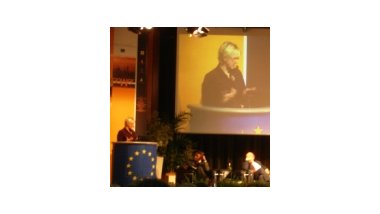Duly observing Europe Day should go beyond discussing the most burning issues of the day. It calls for a reflection on crises that are not acute, but rather require continuous, long-term effort. One of such challenges is the low rates of formal civic participation, especially among young people.
If left unattended to by today’s policy-makers, the phenomenon will result in further disconnectedness of citizens from actual decision-making, which will very likely hinder the rational and sustainable growth of our societies. Bearing in mind the expanding complexity of social and political relations, it should be the aim of local, national, and European policy-making to support broad civic education measures while enabling stable innovative participation methods.
Socialisation should equal politicisation
One is tempted to believe that the relative welfare in Western and Central Europe has led to a state close to complacence and disinterest among most citizens. Indeed, especially the younger generation’s participation in elections at different levels and membership in political parties are on the decline. Paradoxically, however, as shown in Standard Eurobarometer 77 on European Citizenship (2012), going to the polls is still widely considered to be by far the most effective method of participation.
Nonetheless, the feeling of alienation from decision-making has given rise to less conventional channels of engagement, e.g. slacktivism, so-called shitstorms, boycotts, ad-hoc demonstrations without coherent demands etc. Laudable as any form of engagement may be, it is often short-lived and unstructured. Modern social media may also impede taking meaningful action and young people are mostly aware of it: As shown in the above-mentioned Eurobarometer survey only 8% name Internet debates among two most effective ways to make their opinions heard.
Thus, a certain level of formalization is a prerequisite for long-term, impactful participation. For that it is crucial to ensure that citizens truly understand different aspects of the functioning of society and see politics merely as advancement of ideas within the scope of social relations, be it in one’s neighborhood or at the state level. It is high time relevant policy finally recognized that the process of socialization must include greater politicization so that the younger generations can shape politics actively and constructively.
Furthermore, the first half of the 21st century will see the transition between the traditional representative democracy and a more fully developed e-democracy. In view of the waning traditional participation it should be a priority of today’s policy-makers to prepare the first digitized generation for this systemic change.
Unfortunately, the school curricula include mostly theoretical knowledge on social and political systems, without offering young citizens a chance to learn democracy in practice. Usually, little incentive is given to extra-curricular civic engagement. The 2011 Eurobarometer 75.2 on Volunteering and Intergenerational Solidarity (2011) shows that no more than 23% of Europeans aged 15-24 participate in the civil society as volunteers at least occasionally.
All in all, young people seem to have the willingness to participate, though it may be subconscious at times. It is then necessary to turn advanced civic education from a privilege into a right – with more far-reaching policies.
Towards more civil-minded responsibility
To begin with, it is paramount to reform the education system so that it includes more practical engagement with issues of political import. This could be achieved through incorporating more frequent city and county council as well as parliamentary simulations into school syllabi. In the long run it would contribute to a better understanding of certain decision-making processes among young citizens and possibly allow them to develop a stronger will to be part of them.
Moreover, participation in civic projects of authorised NGOs should be encouraged through awarding a more substantial number of credits. To a certain extent, this should be a mandatory part of the curriculum, as such engagement should additionally increase the youth’s interest in social matters.
Paired with the above-mentioned solutions should be further EU guidelines for the Member States willing to introduce legislation improving the quality of volunteering. The European Year of Volunteering 2011 was a helpful initiative, but many European countries are still in need of uncomplicated solutions concerning recognition of such service, reimbursement of expenses, or insurance.
Another policy step could include earmarking more public funding for civic engagement initiatives delegated to accredited NGOs through government grants. Such initiatives should focus on engaging the young generation in discussing current affairs combined with a dialogue with local decision-makers. More attention should be devoted especially to involving middle and secondary school children from disadvantaged socio-economic backgrounds.
In addition, public-non-profit partnerships in the field of civic education should be given more thought. There is much potential for more synergy between the resources of public sector institutions and the innovative methods as well as the sense of mission of non-profits.
Lastly, but very importantly, introducing more e-participation projects should also raise the level of civic participation among digital natives and help pave the way for stable e-democracy practices. For the time being, the impact of such projects as “Hub Website for Youth Participation” remains very limited. However, more such initiatives could invite young people to grapple with specific policy challenges themselves and thus have an empowering effect with regard to formal participation.
Admittedly, these solutions require formulation and implementation at different levels of policy-making. Nevertheless, the fundamental goal is to foster deeper understanding of social and political relations and in turn meaningful civic participation. Its beginning strongly relies on practice-oriented education and the development of pro-sociality in the course of basic-level engagement.
As our society moves deeper into the 21st century, these types of reforms would provide chances for a timely increase of civil-minded responsibility and its transfer into civic participation.





Follow the comments: |
|
